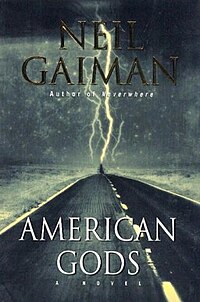Sunday, January 1, 2012
Review - Neil Gaiman - American Gods
"American Gods" was voted #2 of the best Science Fiction & Fantasy books written in the last decade by tor.com. It also won a Hugo award in 2002. I can see why it's well-liked. It's well-written. Gaiman is a wonderful story teller. The story plot has an awesome structure. The endings are satisfying. As an added benefit, if you've happened to visit any of the landmarks described in this book, you'll enjoy the meticulous attention to detail as you watch events unfold. It would be a perfect book if it weren't for three main flaws, which I'll get to in a minute.
First, I'll harp on his humorous grotesque style of writing. It's similar to Stephen King, except where King's horror has an "evil" feel to it, Gaiman's is a little lighter and funny. Think Coraline vs. Carrie. Gaiman also has a knack of coming up with the funniest one-liners and most quotable quotes. He achieves this by taking a common saying and changing or switching a word or two. For example, one character moans about how he wishes to get away "from a world in which opiates have become the religion of the masses."
When you read the book, you learn quickly that gods are real and they walk among us. We humans create the gods by simply believing. When we stop believing, the gods become incredibly impotent. So, you have your old gods, such as the Norse and Roman pantheons. Then you have your newer gods such as technology, media, and industry, etc. One of these gods, who calls himself Wednesday, enlists a human named Shadow to protect him in an upcoming war among the gods. What you get is a highly imaginative story with all kinds of fun twists.
But then there are those three flaws.
#1) The novel is interspersed with random short vignettes of indirectly related dealings between humans and gods. In these short stories, either a god is created, or a god royally screws over a human. These vignettes tend to be Rated R in nature (in a novel that's predominately PG-13). One would expect these vignettes to tie in together with the main story, but the tie-in was very disappointing and not very relevant. (It happens on page 290 in my 460-page edition in almost a footnote.) I snoozed through a couple of the stories, and it didn't seem liked I missed anything when I "scanned."
#2) The book feels like a PG-13 story with some Rated R stuff added just to give the book some "maturity," as if in an attempt to add hair on your chest by reading it. Everybody and their dog drops the F-bomb (which came across to me as a very distracting overused cliche). I know this book explores the human condition and our biggest desires, secrets, and foibles; but if we're all this bad, then we're all screwed. My personal experience is that we humans are much better than this. Because of the book's "mature" elements, I am unable to recommend this book to a majority of my friends.
#3) The characters in the book seem to move around like pieces on a chessboard. It's unclear why some characters do what they do (besides being there to push the story along). When it's hard to care for the characters, that's when I put the book down. I had a very hard time getting through the middle of the book. We do learn near the end what drives some of the characters, but I wish we could have had some of that earlier so I'd care about them earlier.
Despite these flaws, I'm glad I read this book. I look forward to the rumored movie that should be coming out in the near future. I'll probably read more Gaiman down the road, but I have so many books cued up already. When I do get back to him, what shall I read? Maybe I'll read his Underbridge Academy next.
Subscribe to:
Post Comments (Atom)

No comments:
Post a Comment